第6单元 口译中的跨文化交际(上)
- 格式:ppt
- 大小:726.00 KB
- 文档页数:39

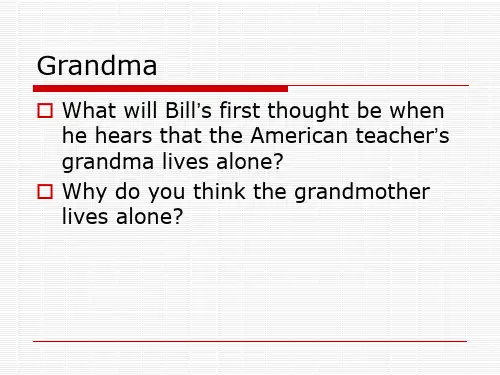
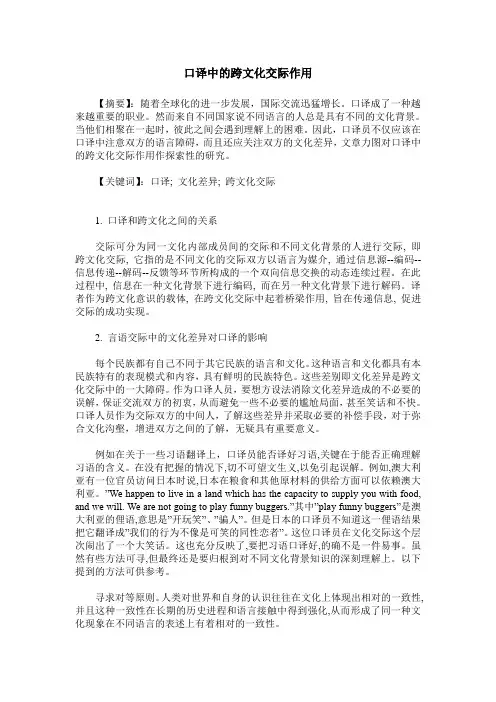
口译中的跨文化交际作用【摘要】:随着全球化的进一步发展,国际交流迅猛增长。
口译成了一种越来越重要的职业。
然而来自不同国家说不同语言的人总是具有不同的文化背景。
当他们相聚在一起时,彼此之间会遇到理解上的困难。
因此,口译员不仅应该在口译中注意双方的语言障碍,而且还应关注双方的文化差异,文章力图对口译中的跨文化交际作用作探索性的研究。
【关键词】:口译; 文化差异; 跨文化交际1. 口译和跨文化之间的关系交际可分为同一文化内部成员间的交际和不同文化背景的人进行交际, 即跨文化交际, 它指的是不同文化的交际双方以语言为媒介, 通过信息源--编码--信息传递--解码--反馈等环节所构成的一个双向信息交换的动态连续过程。
在此过程中, 信息在一种文化背景下进行编码, 而在另一种文化背景下进行解码。
译者作为跨文化意识的载体, 在跨文化交际中起着桥梁作用, 旨在传递信息, 促进交际的成功实现。
2. 言语交际中的文化差异对口译的影响每个民族都有自己不同于其它民族的语言和文化。
这种语言和文化都具有本民族特有的表现模式和内容,具有鲜明的民族特色。
这些差别即文化差异是跨文化交际中的一大障碍。
作为口译人员,要想方设法消除文化差异造成的不必要的误解,保证交流双方的初衷,从而避免一些不必要的尴尬局面,甚至笑话和不快。
口译人员作为交际双方的中间人,了解这些差异并采取必要的补偿手段,对于弥合文化沟壑,增进双方之间的了解,无疑具有重要意义。
例如在关于一些习语翻译上,口译员能否译好习语,关键在于能否正确理解习语的含义。
在没有把握的情况下,切不可望文生义,以免引起误解。
例如,澳大利亚有一位官员访问日本时说,日本在粮食和其他原材料的供给方面可以依赖澳大利亚。
”We happen to live in a land which has the capacity to supply you with food, and we will. We are not going to play funny buggers.”其中”play funny buggers”是澳大利亚的俚语,意思是”开玩笑”、”骗人”。
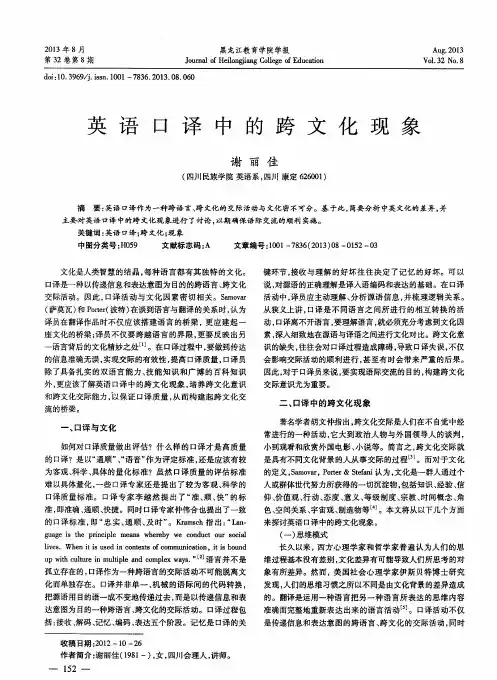
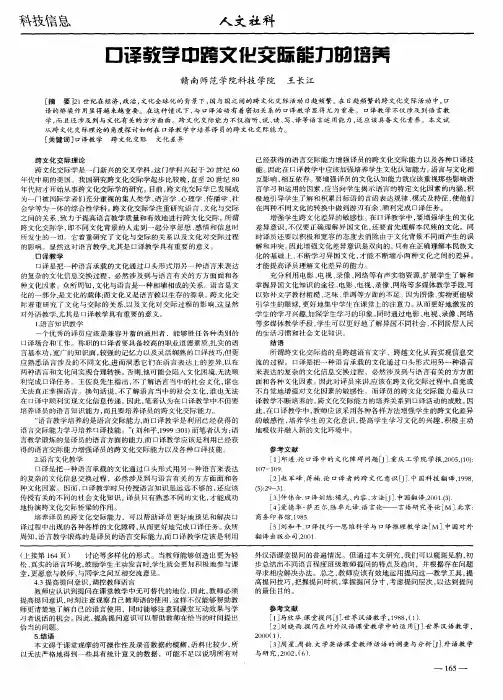

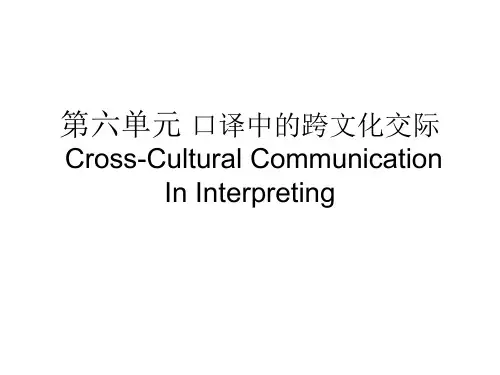
![英汉汉英口译基础教程Unit 6 Diplomatic Exchange[精]](https://uimg.taocdn.com/008d4373a8114431b90dd8ee.webp)
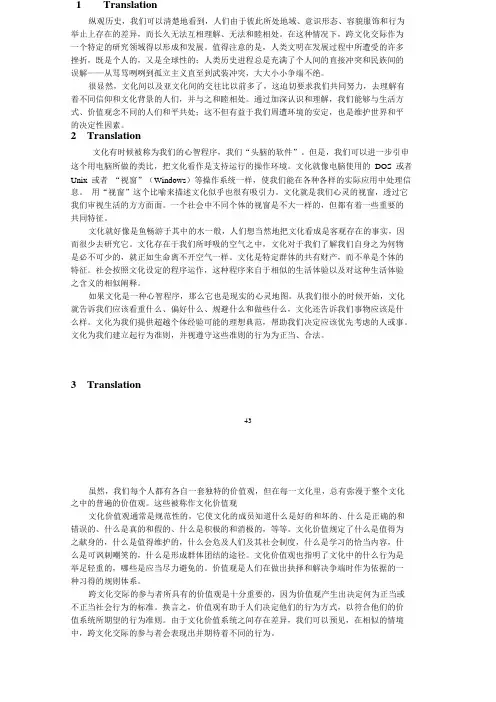
1 Translation纵观历史,我们可以清楚地看到,人们由于彼此所处地域、意识形态、容貌服饰和行为举止上存在的差异,而长久无法互相理解、无法和睦相处。
在这种情况下,跨文化交际作为一个特定的研究领域得以形成和发展。
值得注意的是,人类文明在发展过程中所遭受的许多挫折,既是个人的,又是全球性的;人类历史进程总是充满了个人间的直接冲突和民族间的误解——从骂骂咧咧到孤立主义直至到武装冲突,大大小小争端不绝。
很显然,文化间以及亚文化间的交往比以前多了,这迫切要求我们共同努力,去理解有着不同信仰和文化背景的人们,并与之和睦相处。
通过加深认识和理解,我们能够与生活方式、价值观念不同的人们和平共处;这不但有益于我们周遭环境的安定,也是维护世界和平的决定性因素。
2 Translation文化有时候被称为我们的心智程序,我们“头脑的软件”。
但是,我们可以进一步引申这个用电脑所做的类比,把文化看作是支持运行的操作环境。
文化就像电脑使用的DOS或者Unix或者“视窗”(Windows)等操作系统一样,使我们能在各种各样的实际应用中处理信息。
用“视窗”这个比喻来描述文化似乎也很有吸引力。
文化就是我们心灵的视窗,透过它我们审视生活的方方面面。
一个社会中不同个体的视窗是不大一样的,但都有着一些重要的共同特征。
文化就好像是鱼畅游于其中的水一般,人们想当然地把文化看成是客观存在的事实,因而很少去研究它。
文化存在于我们所呼吸的空气之中,文化对于我们了解我们自身之为何物是必不可少的,就正如生命离不开空气一样。
文化是特定群体的共有财产,而不单是个体的特征。
社会按照文化设定的程序运作,这种程序来自于相似的生活体验以及对这种生活体验之含义的相似阐释。
如果文化是一种心智程序,那么它也是现实的心灵地图。
从我们很小的时候开始,文化就告诉我们应该看重什么、偏好什么、规避什么和做些什么,文化还告诉我们事物应该是什么样。
文化为我们提供超越个体经验可能的理想典范,帮助我们决定应该优先考虑的人或事。
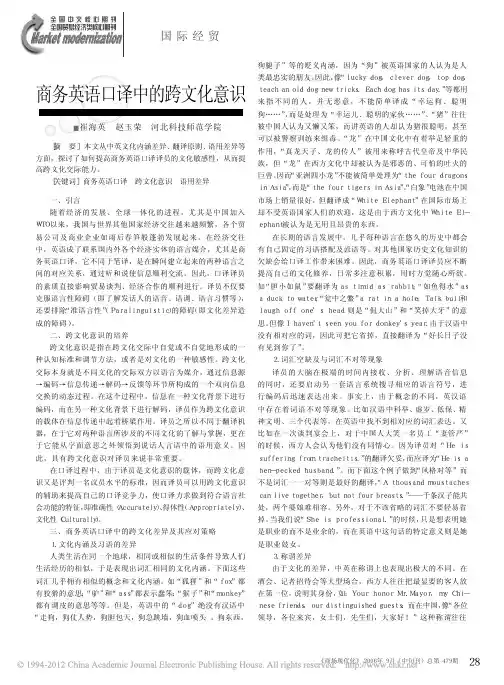
28《商场现代化》2006年9月(中旬刊)总第479期国际经贸一、引言随着经济的发展、全球一体化的进程,尤其是中国加入WTO以来,我国与世界其他国家经济交往越来越频繁,各个贸易公司及商业企业如雨后春笋般蓬勃发展起来。
在经济交往中,英语成了联系国内外各个经济实体的语言媒介,尤其是商务英语口译,它不同于笔译,是在瞬间建立起来的两种语言之间的对应关系,通过听和说使信息顺利交流。
因此,口译译员的素质直接影响贸易谈判、经济合作的顺利进行。
译员不仅要克服语言性障碍(即了解发话人的语音、语调、语言习惯等),还要排除“准语言性”(Paralinguistic)的障碍(即文化差异造成的障碍)。
二、跨文化意识的培养跨文化意识是指在跨文化交际中自觉或不自觉地形成的一种认知标准和调节方法,或者是对文化的一种敏感性。
跨文化交际本身就是不同文化的交际双方以语言为媒介,通过信息源→编码→信息传递→解码→反馈等环节所构成的一个双向信息交换的动态过程。
在这个过程中,信息在一种文化背景下进行编码,而在另一种文化背景下进行解码,译员作为跨文化意识的载体在信息传递中起着桥梁作用。
译员之所以不同于翻译机器,在于它对两种语言所涉及的不同文化的了解与掌握,更在于它能从字面意思之外领悟到说话人言语中的语用意义。
因此,具有跨文化意识对译员来说非常重要。
在口译过程中,由于译员是文化意识的载体,而跨文化意识又是评判一名议员水平的标准,因而译员可以用跨文化意识的辅助来提高自己的口译竞争力,使口译力求做到符合语言社会功能的特征,即准确性(Accurately)、得体性(Appropriately)、文化性(Culturally)。
三、商务英语口译中的跨文化差异及其应对策略1.文化内涵及习语的差异人类生活在同一个地球,相同或相似的生活条件导致人们生活经历的相似,于是表现出词汇相同的文化内涵。
下面这些词汇几乎拥有相似的概念和文化内涵。
如“狐狸”和“fox”都有狡猾的意思;“驴”和“ass”都表示蠢笨;“猴子”和“monkey”都有调皮的意思等等。

口译过程中的跨文化交际能力培养作者:肯巴特·库莫纳来源:《文艺生活·文海艺苑》2013年第11期摘要:口译是一个口头转述的过程,是一个把一种语言的信息快速和准确传达给另一不了解这种语言的人的过程。
作为不同文化间交流的活动,口译拥有自己的特点,因为口译员所面对的不仅是两种语言,而且是两种文化,没有跨文化交际的能力,没有深入了解文化间的不同,就不能更好地在不同的文化背景下进行交流,从而翻译出高水平的译文。
本文的研究对象是口译过程中的跨文化交际能力的培养,笔者将会从口译的概念特点,跨文化交际的概念,跨文化交际能力的概念特点入手,来阐述口译过程中跨文化交际能力的培养以及翻译策略。
关键词:口译者;跨文化交际;跨文化交际能力中图分类号:H059 文献标识码:A 文章编号:1005-5312(2013)33-0082-02一、跨文化交际与跨文化交际能力(一)跨文化交际的概念跨文化交际是来自不同文化背景的人之间传递信息,交流思想的一种社会行为。
这种社会行为可以是国家之间、民族之间、个人之间的交际活动,内容可能涉及不同的政策、价值观、风俗、宗教、历史、礼仪等等。
因此,即使是具备良好语言能力的人,在跨文化交际中也不可避免地会受到各种社会因素的制约和影响,例如不同的社会背景、历史、政治制度、价值观、宗教信仰、风俗学,跨文化交际者如果不能很好的理解两种文化并具备一定的跨文化交际能力,难免在这种交际的过程中出现一些理解和处理方面的失误。
(二)跨文化交际能力的概念跨文化交际能力是一个特定的概念,即作为非母语的或第二语言的外语交际能力。
它绝不是只限于口头的理解与表达能力,而理所当然地包括书面语的理解与表达能力。
人们以前习惯上把跨文化交际能力只理解为前一种能力的说法或做法,是不完整的和有害的。
也就是说,外语教学所培养的学生应具备用所学语言进行跨文化交际的各种素养。
(三)跨文化交际能力的分类1.语言能力,掌握扎实、宽广的语言知识和言语技能;熟悉语言结构和语言单位所隐含的民族文化成分。
跨文化交际:商务谈判口译场景模拟出场人物:A公司李经理1 胡经理2 A翻译小刘B公司黄经理1 吕经理2 B翻译小陈A总1:黄小姐,上午好!首先,衷心感谢您对我们公司一直以来的关注和支持,也期望这次的谈判能取得双赢的结果。
B翻译: Good morning, Miss. Huang, first of all, sincerely appreciates your concern and support for our company. We are looking forward to achieving a win-win deal for this negotiation.B总1:We have had much happy collaboration with your company over these years. And I hope that we can develop a more lasting relationship.A翻译: 之前和贵公司的合作都很愉快,我也希望我们之间能发展一个更为持久的合作关系A总1:是的,这也是我们今天要商讨的一件重大事项。
如您所知,我们公司一直以研发电子产品为主。
B翻译: Yes, it’s also one of the most important events we are going to negotiate. As you know, our company has always put the electronic products on the research and development.A总1:目前经济竞争激烈,即使是向来胸有成竹的我们也不得不开始寻求新的市场定位,进行一场大改革。
B翻译员: At present, the economy competition is so fierce that we have no other choice but to reform. Even though we are confident all the time, we must begin to seek new market positioning.B总1:I can’t agree with you more. As the saying goes, “Be prepared for danger in times of peace.” We cannot improve ourselves if we don’t challenge change.A翻译:我很赞同您的观点,正所谓“居安思危”,不思变就不能进步。